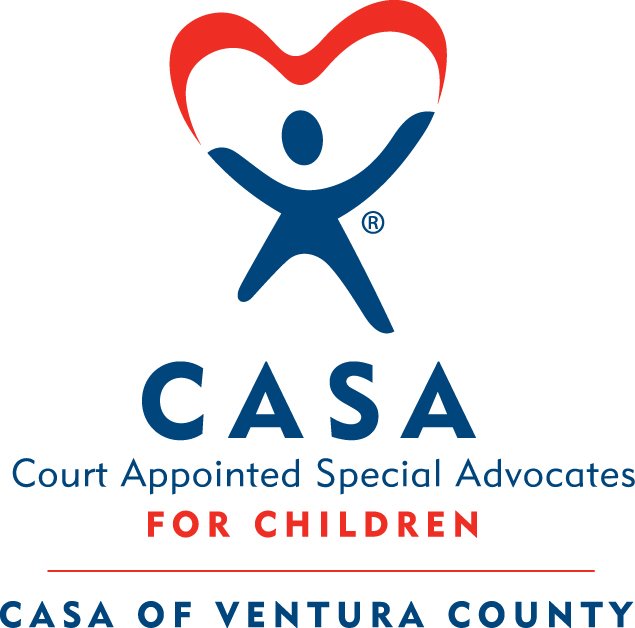Frequent Questions
What does Court Appointed Special Advocates (CASA) of Ventura County do?
Court Appointed Special Advocates (CASA) of Ventura County recruits, screens, trains, and supports citizen-volunteers to advocate for the best interests of abused and neglected foster children in courtrooms and communities.
What is a CASA volunteer?
A Court Appointed Special Advocate (CASA) volunteer is a trained citizen who is appointed by a judge to represent the best interests of a court dependent child. Children helped by CASAs include those for whom home placement is being determined in juvenile court. Most of the children are victims of abuse and neglect.
What is the CASA volunteer’s role?
A CASA builds a one-on-one relationship with a local foster child and also talks with the child’s social worker, caregiver, school officials, health providers and others who can offer insight into the well-being of the child. The purpose is to provide the court with carefully gathered information about how the child is doing, as well as make recommendations, while they are part of the dependency court system. This information helps the court make a sound decision about the child’s future.
Where do CASA volunteers get their authority?
The authority for a CASA program comes from the Rule of Law 5.655 and the State of California’s Welfare and Institution Code 100. The code states that each CASA shall serve at the pleasure of the court having jurisdiction over the proceedings in which a CASA has been appointed and that the CASA shall do all of the following:
- Provide independent, factual information to the court regarding the cases to which he or she is appointed.
- Represent the best interests of the children involved, and consider the best interests of the family, in the cases to which he or she is appointed. (W&I Code 102c)
Juvenile court judges implement the CASA program in their courtrooms and assign cases to the CASA program. When a volunteer is appointed to a case, they become an official part of the judicial proceedings, working alongside attorneys and social workers as an appointed officer of the court. At the time of their appointment, the volunteer is given an Order of Appointment signed by the judge that gives them the authority to act on their assigned case.
How does the CASA volunteer relate to the child he or she represents?
CASAs offer children trust and advocacy during the complex legal proceedings. CASAs contact the child on a regular basis to observe and gather information about the child’s well being. They encourage the child to express his or her own opinion and hopes while remaining objective observers. They explain to the child the events that are happening, the reasons they all are court dependent, and the roles the judge, lawyers and social workers play.
How does a CASA volunteer gather information about a case?
To prepare a recommendation, the CASA talks with the child, social worker, caregiver, school officials, health providers and others who can offer insight into the well-being of the child. The CASA also reviews records pertaining to the child -- court, school, medical, and case worker reports along with other documents as case informational needs are identified.
What can a CASA volunteer NOT do? Are there any prohibited activities?
CASA volunteers are prohibited from:
- Taking a child to the CASA volunteer's home
- Giving legal or therapeutic advice
- Giving money or expensive gifts to the child or family
- Being related to any parties involved in a case or being employed in a position and/or agency that might result in a conflict of interest
- Any other activities prohibited by the juvenile court and the CASA of Ventura County program
How does a CASA volunteer differ from a social service caseworker?
Social workers generally are employed by county governments. They work on several cases at a time, while the CASA is a volunteer with more time and smaller caseloads (typically no more than two children). The CASA does not replace a social worker on a case: he or she is an independent appointee of the court. The CASA makes recommendations to the court independent of the social service worker.
How does the role of a CASA volunteer differ from an attorney?
The CASA does not provide legal representation in the courtroom. That is the role of the attorney. However, the CASA does provide crucial background information that can assist attorneys in presenting their cases. The CASA advocates for the best interests of the child and makes fact based recommendations to the court.
Is there a “typical” CASA volunteer?
We have CASAs from all walks of life! No special background or education is required to become a volunteer. We encourage people from all cultures and professions, and of all ethnic and educational backgrounds. Once accepted into the program, you will receive all necessary training in courtroom procedures, social services, and the special needs of abused or neglected children.
I don't have any experience with the dependency system, youth living in foster care, or legal experience. Does this mean I am not qualified to serve as a CASA volunteer?
Definitely not! No prior knowledge of the foster care system or legal experience is required. Once accepted into the program, you will receive all necessary training in courtroom procedures, social services, and the special needs of abused or neglected children.
I have no children of my own. Can I still be an effective CASA volunteer?
Yes! Many of our CASAs do not have children, others have little to no experience working with children, and all still make wonderful CASAs. Bring your desire to help and support children and we will provide all the training you need!
I work full time Monday through Friday. Does this mean I can't be a CASA volunteer?
Not necessarily! Many of our CASA volunteers work full time, though it is important to have some flexibility in your schedule. As a CASA Volunteer, you can expect to spend an average of about 12-15 hours a month working on your case, including time spent on the following activities: visiting with the child; participating in meetings and court hearings; communicating with professionals, family members, and caregivers; and documenting your visits and advocacy progress in your child’s file. Many of these activities are self-scheduled, so often you will be able to have evening activities/meetings, but some do require daytime flexibility. We do ask that CASA volunteers always be present at court hearings and actively attend meetings whenever possible. Hearings (at least every six months) are held during the day, as are most meetings with professionals. In most cases, meetings are scheduled with sufficient advance notice, but you may need to plan for flexing your work time or shifting your schedule by a couple hours (about once a month) to allow for a meeting during typical business hours. We recommend that you discuss this opportunity with your employer. Many employers are very supportive after learning more about the program.
I like to travel. Can I still be a CASA volunteer?
Yes! Unless you will be away frequently and for long durations (one month or more), and as long as you give notice first and foremost to your Appointee(s) and speak with your case supervisor, your vacation or travel plans are not likely to interfere with your advocacy.
Can I advocate for a child who lives close to my home or work?
Maybe. Case assignments are based on need, not location. We ask that you be as open-minded and flexible as possible, as it is not unusual for children in foster care to change home placements frequently.
What training does a CASA volunteer receive?
Upon successfully completing and passing thorough background checks and an interview, CASAs undergo a comprehensive training course conducted by the local CASA program. During their training, which averages 40 hours, volunteers learn about social service and courtroom procedures from the principals in the system – lawyers, social workers, court personnel and others. The CASAs also learn effective advocacy techniques and are educated about family systems and the effects that abuse, neglect and abandonment has on children. Once the volunteers have completed and passed their training, they are sworn in as officers of the court and take an oath to conduct themselves in accordance with the rules of the court.

